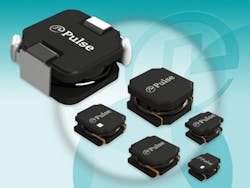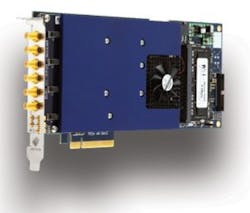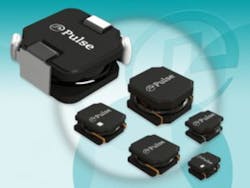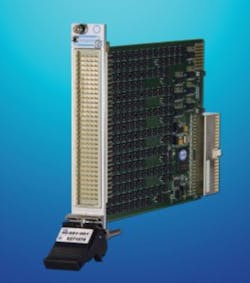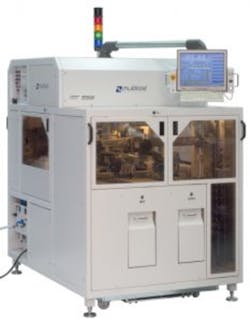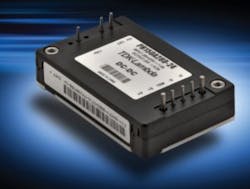The frequency range and dynamic performance of these AWGs make them of interest to engineers and scientists working in areas such as communications, radio, radar, semiconductors, nanotechnology, media testing, automation, ultrasound, optics, and medical and biological science. Spectrum
Offering good EMI performance, these inductors have core geometries and construction that enable high currents with no radiated magnetic fields to interfere with associated components. The family consists of six series of parts: the PA4330, PA4331, PA4332, PA4333, PA4334, and PA4335, which vary by footprint, current rating, and inductance range. Pulse Electronics
The use of high-performance solid-state relays ensures that the 40-681 MUX has a long service life even when hot switching into capacitive loads. It can sustain 1.5 A for 100 ms on hot or cold switching. Pickering Interfaces
The high-voltage setup uses a standard MT9510 base unit. All application-specific requirements are covered with the design of the dedicated high-voltage conversion kit to provide flexibility at the test floor, best return on investment, and lowest cost of test. With its favorable cost structure, the MT9510 high-voltage solution also meets the targets of more cost-sensitive applications in the consumer market. Multitest
Level changes can be made on the fly without interrupting the signal, enabling users to simultaneously perform independent sensitivity tests for each navigation system. The 1-PPS (pulse per second) or 10-PPS GNSS marker allows exact time synchronization between the tester and the DUT. Pure, level-stable CW signals also can be generated to calibrate the test setup or simulate interferers. Rohde & Schwarz
The six new PH-A280 power modules are available in three output power levels: 75 W, 100 W, and 150 W. The complete product family encompasses nominal output voltages of 3.3 V, 5 V, 12 V, 15 V, 24 V, 28 V, or 48 V, adjustable by -20% to +10% (±20% for 5-V output models). Efficiencies of up to 90% are achieved, an improvement of 5% over the prior PH Series versions. TDK
SIGTRAN test suite
The enhanced SIGTRAN Protocol Test Suite for Hybrid Networks enables the MAPS protocol test simulation platform to support SIGTRAN (SS7 over IP) and ISDN SIGTRAN (ISDN over IP). Some of the common MAPS features supported across all SIGTRAN protocols include scripted call generation and call reception, ready-to-use scripts for quick testing, and a script-based and protocol-independent software architecture.
The enhanced SIGTRAN Protocol Test Suite now provides an enhanced feature-rich MAPS framework, which includes user-defined statistics, video traffic support, voice-quality scores, and command line interface (CLI) functionalities. Using CLI, all of GUI functions can be controlled by various TCL, Python, VBScript, Java, and .Net clients. GL Communications
RF signal and sweep generator
The SynthNV programmable 34.4-MHz to 4.4-GHz software-tunable RF signal and sweep generator includes a built-in RF power detector. It is controlled and powered from any device running Windows, Linux, or Android OS via a USB port. The included onboard RF power detector can be used as a generic RF power meter or combined with the SynthNV’s sweep function to create a basic RF network analyzer. When the RF signal generator frequency is set, RF power can be measured in less than 400 μs. The SynthNV design also includes nonvolatile memory so it can be programmed to wake up with any frequency, power, sweep, and modulation setting. Saelig
DC electronic load
The ELR9000 Series DC electronic load features an integral, grid-synchronized inverter designed to return up to 94% of the load test energy back to the grid. The rack-mounted unit is available, off-the shelf, with output ratings of 3.5 kW, 7 kW, and 10.5 kW—scalable to 105 kW.
The ELR9000 Series offers four common regulation modes: constant voltage, constant current, constant resistance, and constant power. The FPGA-based operational controls include a function generator and a table-based regulation circuit for the simulation of nonlinear internal resistances. The vendor’s PowerStar 6 software package enables the creation of test routines using a drag-and-drop menu where coding can be performed without programming. Intepro
EMI receiver option
Real-time spectrum analysis (RTSA) now is available as an option for the vendor’s standards-compliant MXE EMI receiver. Adding RTSA to an MXE enables test labs to observe and diagnose transient and wideband emissions during EMC compliance and precompliance testing.
With RTSA, engineers can more easily see and understand high-speed transient signals that are difficult to capture with traditional spectrum or signal analyzers. This is especially useful in applications such as radar, automotive, and wireless communications that often experience fast-moving, short-duration emissions. Keysight Technologies
